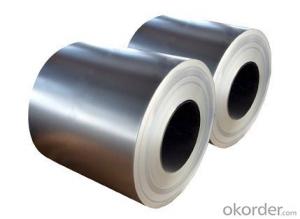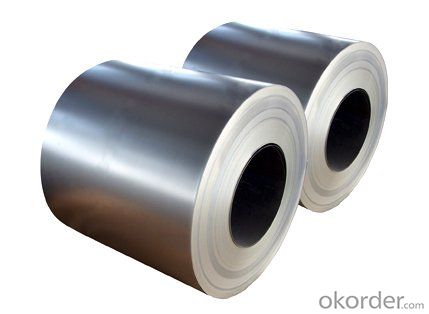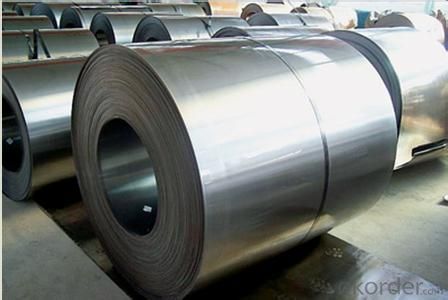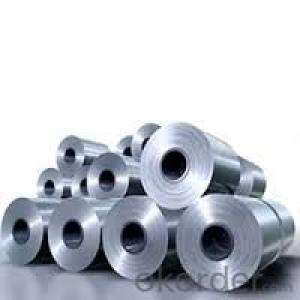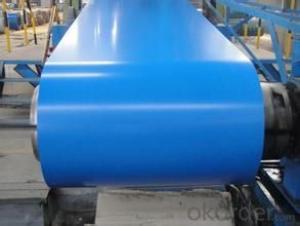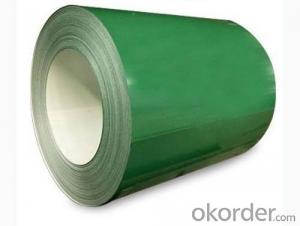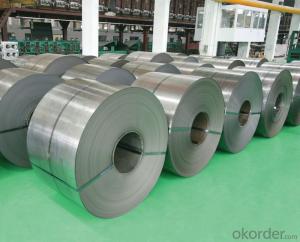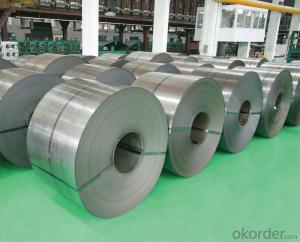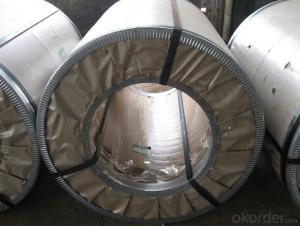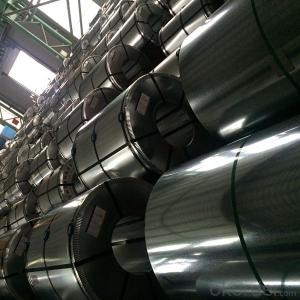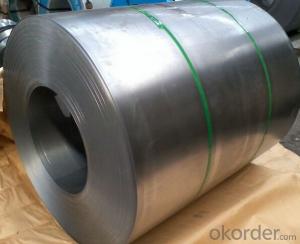Cold Rolled Steel Coil with First Class Quality and Best Selling
- Loading Port:
- Tianjin
- Payment Terms:
- TT OR LC
- Min Order Qty:
- 500 m.t.
- Supply Capability:
- 50000 m.t./month
OKorder Service Pledge
OKorder Financial Service
You Might Also Like
1.Structure of Cold Rolled Steel Description:
The raw material of cold rolled steel coil/sheet is high quality hot rolled product, and after pickling continuous rolling, degreasing, annealing,skin pass,slitting and cut to length line etc. Along with it many kinds of new technology and new process of global cold rolling production have been applied. Therefore the quality of the goods could be guaranteed. The product is widely used in outdoor and interior decoration, furnishing manufacturing, home appliance, automobile etc.
2.Main Features of the Cold Rolled Steel:
• Excellent process capability
• Smooth and flat surface
• Workability, durability
• Excellent heat resistance performance
• High strength
• Good formability
• Good visual effect
3.Cold Rolled Steel Images
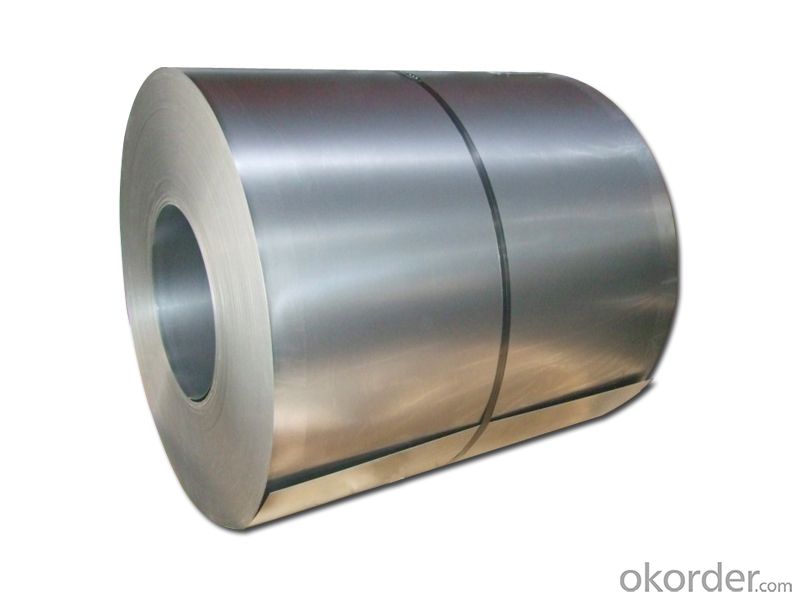
4.Cold Rolled Steel Specification
Standard:AISI,ASTM,DIN,GB,JIS,JIS G3302 ASTM 653M EN10142
Grade: Q195~Q345
Thickness: 0.16mm~1.5mm,0.16-1.5mm
Width: 1250,600-1250mm
Coil weight:3-12 MT
Coil ID:508/610mm
Chemical composition:
C | Si | Mn | Cr | Ni | P | S |
0.150 | 0.476 | 11.231 | 12.50 | 0.900 | 0.039 | 0.010
|
5.FAQ of Cold Rolled Steel
We have organized several common questions for our clients,may help you sincerely:
1.How about your company?
A world class manufacturer & supplier of castings forging in carbon steel and alloy steel,is one of the large-scale professional investment casting production bases in China,consisting of both casting foundry forging and machining factory. Annually more than 8000 tons Precision casting and forging parts are exported to markets in Europe,America and Japan. OEM casting and forging service available according to customer’s requirements.
2.How to guarantee the quality of the products?
We have established the international advanced quality management system,every link from raw material to final product we have strict quality test;We resolutely put an end to unqualified products flowing into the market. At the same time, we will provide necessary follow-up service assurance.
3. How long can we receive the product after purchase?
Usually within thirty working days after receiving buyer’s advance payment or LC. We will arrange the factory manufacturing as soon as possible. The cargo readiness usually takes 15-25 days, but the shipment will depend on the vessel situation.
- Q: what pokemon are week to steel type pokemon like lucario? help please, and thank you.
- Rock pokemon are weak against steel type moves.
- Q: How are steel coils used in the manufacturing of steering systems?
- Steel coils are used in the manufacturing of steering systems as they provide the necessary strength and durability required for the components of the system, such as steering columns, gears, and shafts. These coils are shaped and formed into various parts through processes like cutting, bending, and welding, ultimately contributing to the overall stability and functionality of the steering system in vehicles.
- Q: How are steel coils used in the production of electrical devices?
- Steel coils are an essential component in the production of electrical devices. These coils are typically made from high-quality steel that is precisely wound into a circular shape. They play a crucial role in the functioning of various electrical devices, such as transformers, motors, generators, and inductors. One primary use of steel coils is in transformers. Transformers are vital for stepping up or stepping down voltage levels in electrical circuits. They consist of two separate coils, known as the primary and secondary coils, which are wound around a magnetic core. The steel coil provides stability and support to the windings, ensuring proper alignment and preventing any deformation. Additionally, the high magnetic permeability of steel helps to enhance the efficiency of energy transfer between the coils. In motors and generators, steel coils are employed to create magnetic fields that generate mechanical energy or convert it into electrical energy. The coils are wound around an armature or rotor, which rotates within a magnetic field created by a stator. As the current flows through the coils, a magnetic field is produced, resulting in the rotation of the armature or the generation of electrical power. Inductors, another type of electrical device, also utilize steel coils. An inductor is essentially a coil of wire wound around a core material, often made of steel. Steel coils in inductors help to increase the inductance, which is a measure of the device's ability to store energy in a magnetic field. By storing energy in this manner, inductors can regulate currents, filter out noise, and provide stability to electrical circuits. Overall, steel coils play a vital role in the production of electrical devices by providing stability, support, and enhancing the magnetic properties necessary for their efficient functioning. Without steel coils, the performance and reliability of electrical devices, such as transformers, motors, generators, and inductors, would be significantly compromised.
- Q: Can steel coils be customized in terms of size and specifications?
- Yes, steel coils can be customized in terms of size and specifications. Manufacturers have the ability to produce steel coils in various sizes and specifications to meet the specific requirements and needs of different industries and applications. This customization allows for greater flexibility and ensures that the steel coils can be used efficiently in different processes.
- Q: Can steel coils be used in the production of construction machinery?
- Yes, steel coils can be used in the production of construction machinery. Steel coils are often used as raw materials for manufacturing various components of construction machinery, such as frames, supports, and structural parts. The strength, durability, and resistance to corrosion of steel make it an ideal material for construction machinery, ensuring the longevity and reliability of the equipment.
- Q: How are steel coils used in the manufacturing of fuel systems?
- Steel coils are commonly used in the manufacturing of fuel systems for their strength, durability, and resistance to heat and corrosion. These coils are typically formed into various components such as fuel tanks, pipelines, and fuel lines. The steel coils provide structural support and ensure the integrity of the fuel system, enabling safe and efficient transportation, storage, and delivery of fuel.
- Q: How are steel coils used in the manufacturing of industrial pumps?
- Steel coils are used in the manufacturing of industrial pumps as they are typically used to construct the pump housing and impellers, providing the necessary strength and durability for handling high-pressure fluids and withstanding harsh operating conditions. The steel coils are processed and shaped into various components, ensuring the structural integrity and reliability of the pump, ultimately contributing to its efficient operation and long lifespan.
- Q: How are steel coils used in the manufacturing of automotive exhaust systems?
- Steel coils are used in the manufacturing of automotive exhaust systems as they are formed into specific shapes and sizes to create the necessary components, such as pipes, mufflers, and catalytic converters. The coils are precision-cut, welded, and bent to fit the design requirements and ensure efficient exhaust flow, durability, and resistance to high temperatures and corrosion.
- Q: What are the main properties of steel coils?
- Steel coils possess a multitude of characteristics that render them highly sought-after for a vast array of applications. Primarily, steel coils are renowned for their exceptional robustness and longevity. Boasting a high tensile strength, they exhibit an ability to withstand substantial loads and resist deformation. Consequently, steel coils are the optimum choice for applications that necessitate structural integrity and dependability. Moreover, steel coils exhibit remarkable resistance to corrosion. They possess an inherent capacity to generate a protective oxide layer on their surface, thereby preventing rust and other forms of corrosion. This attribute renders steel coils suitable for applications conducted outdoors or in environments characterized by high humidity or exposure to chemicals. Additionally, steel coils exhibit excellent thermal conductivity, facilitating the efficient transfer of heat. This feature renders them widely employed in heating and cooling systems, as well as in the production of various appliances and machinery. Furthermore, steel coils boast commendable formability, enabling them to be effortlessly shaped or bent into diverse configurations without compromising their strength. This quality endows them with versatility and adaptability, thereby proving indispensable in various manufacturing processes such as stamping, rolling, or welding. Lastly, steel coils are available in an extensive range of grades and thicknesses, allowing for customization based on specific application requirements. This versatility renders steel coils suitable for a vast array of industries, including automotive, construction, manufacturing, and energy. In conclusion, the main attributes of steel coils encompass strength, durability, corrosion resistance, thermal conductivity, formability, and versatility. These characteristics establish steel coils as a popular and dependable choice for a myriad of applications.
- Q: How do steel coil manufacturers minimize waste and maximize efficiency?
- Steel coil manufacturers can minimize waste and maximize efficiency through a combination of advanced technology, process optimization, and waste management practices. One way to achieve this is by using advanced automation and control systems in the production process. These systems can monitor and adjust various parameters such as temperature, pressure, and speed, ensuring that the manufacturing process operates at the optimal level. By closely monitoring and controlling these parameters, manufacturers can reduce the occurrence of defects and errors, which in turn minimizes waste. Another approach is to implement lean manufacturing principles. This involves eliminating any non-value-adding activities and streamlining the production process to reduce waste and increase efficiency. By carefully analyzing the entire production workflow, manufacturers can identify areas that can be improved, such as reducing setup times, eliminating bottlenecks, and optimizing material flow. This results in a more efficient and streamlined production process, minimizing waste and maximizing productivity. Furthermore, steel coil manufacturers can implement effective waste management practices. This includes proper handling and disposal of waste materials, as well as implementing recycling programs. By separating and recycling materials such as scrap metal, manufacturers can reduce the amount of waste generated and minimize the environmental impact of their operations. Additionally, manufacturers can explore partnerships with recycling companies to ensure that waste materials are properly managed and recycled. In summary, steel coil manufacturers can minimize waste and maximize efficiency by utilizing advanced technology, implementing lean manufacturing principles, and implementing effective waste management practices. By continuously striving for improvement and optimization in their processes, manufacturers can reduce waste, increase productivity, and ultimately achieve higher levels of efficiency.
Send your message to us
Cold Rolled Steel Coil with First Class Quality and Best Selling
- Loading Port:
- Tianjin
- Payment Terms:
- TT OR LC
- Min Order Qty:
- 500 m.t.
- Supply Capability:
- 50000 m.t./month
OKorder Service Pledge
OKorder Financial Service
Similar products
Hot products
Hot Searches
Related keywords
